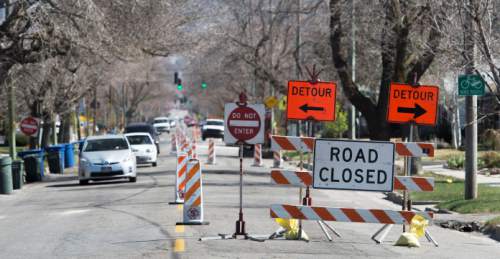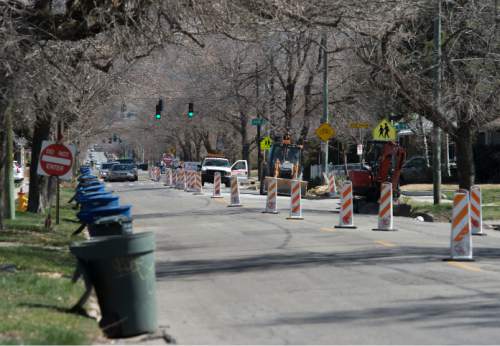This is an archived article that was published on sltrib.com in 2015, and information in the article may be outdated. It is provided only for personal research purposes and may not be reprinted.
While a 5-cent-a-gallon gasoline tax hike kicks in Jan. 1, whether Utahns like or not, voters will be able to decide whether to also raise sales taxes for transportation.
Cities, counties and the Utah Transit Authority are strategizing about when to hold these elections, and how to persuade taxpayers to OK a little heavier tax burden. The proposition may be complicated by controversies over UTA executive pay, travel and alleged sweetheart deals with developers.
But like alpine climbers roped to one another, the three groups must succeed or fall together because of the way lawmakers wrote the authorizing legislation. HB362, expected to be signed by Gov. Gary Herbert, raised and reformed the gasoline tax, and allowed local governments to ask voters to increase the sales tax by a quarter-cent per dollar — or 25 cents per $100 — in sales.
In urban counties, 40 percent of that revenue would go to cities and 40 percent to UTA. The remaining 20 percent would go to counties. In rural areas without a countywide transit district, 40 percent would go to cities and 60 percent to counties.
House Transportation Committee Chairman Johnny Anderson, R-Taylorsville, who sponsored the bill, noted the three groups had sought permission for separate sales-tax hikes in recent years.
He said it was important for all to move forward together, rather than leave out one group — and he let the three work out the revenue split.
—
Strategy • Cameron Diehl, director of governmental affairs for the Utah League of Cities and Towns, said representatives of the three groups plan to meet next week to discuss the timing of these elections, to be held on a county-by-county basis, and begin forming strategy on a voter-education campaign.
Elections could be held as early as this November, next year or later. Diehl said many cities would like to move quickly because they need the money.
Lincoln Shurtz, director of government affairs for the Utah Association of Counties, said counties have talked about moving in unison to have elections at the same time, but some smaller counties may go their own way and decide to delay elections or skip them. Legislators have worried disparate tax rates might lead shoppers to go to lower-tax counties for big purchases, such as cars.
"If some counties chose not to participate in the tools that the Legislature has given them, then that doesn't help solve that part of the [transportation] problem," Anderson said. "I guess that's their problem. If they want to solve it on their own, they can. That's the best we can do for them."
Shurtz and Diehl said the three levels of government are also discussing how to sell the need for the tax. Cities and counties plan to talk about how their 30 percent share of the state gas tax has not kept up with demands.
"The gas tax now provides only about 40 percent of the aggregate need statewide for city roads," Diehl said. "The rest comes from local general funds, and the backlogs for road projects are huge."
Similarly, gas taxes are providing only about half the funding for county roads and highways, Shurtz said. "Because we have not had an increase in the 24.5-cent-per-gallon gasoline tax since 1997, the needs are desperate."
—
Transit plans • UTA spokesman Remi Barron said his agency has yet to figure exactly how it would use its share of a sales-tax increase. "Those plans are not definite at this time. We will continue to work with the transportation coalition, local elected officials and the community on potential scenarios."
UTA has been criticized in the news media and a legislative audit last year for high executive pay and bonuses, extensive travel by administrators and controversial deals with well-connected developers. That could make selling a tax hike harder for all groups with a stake in the elections.
Community activist and longtime UTA critic Claire Geddes said she, for one, would fight a tax hike. "I would oppose any increase until UTA is more accountable," she said, adding the agency should not seek more money when UTA President Michael Allegra's 2013 compensation (the most recent reported in public records) was $402,187, including a $30,000 bonus.
Geddes said voters should demand pay cuts or removal of top officials before a tax increase.
But other groups, such as the Utah Transit Riders Union, have supported a tax hike in hopes UTA would use the extra revenue to expand night and weekend bus service.
UTA's bad publicity might prove a challenge, Shurtz acknowledged, but "it depends on which county you are in. ... Salt Lake County is very supportive and UTA probably helps get the funding approved by voters. There are other counties where that may not necessarily be the case."
UTA serves all of Salt Lake, Utah, Davis and Weber counties. It serves portions of Tooele and Box Elder counties. Because the agency covers only some cities in those two counties, UTA would not be included in the revenue split of any sales tax increase there.
—
Changes • Barron said UTA has taken steps to address all criticisms in the state audit. For example, last September its board cut the maximum bonus allowed for executives to $7,500 a year — down dramatically from the $30,000 that had been awarded to top officials.
He also said that as current leaders are replaced over time, "salaries for executive positions, if they are higher than market norms, would be reduced when filled."
UTA is trying to get out word, Barron said, "that our ridership is the highest in our history, and our operational and overhead costs are among the lowest."
While the agency touts its transparency, its board is scheduled next week — as part of a regular review of its policies — to reaffirm one that bans all board members, except its chairman and vice chairman, from talking to the news media.
This policy has been in place for more than a decade, Barron said, and "provides guidance designating the chairman to represent the board with the media." Nevertheless, he said, board members "are strong champions of transparency, and UTA is highly transparent and accessible to the media."
Anderson, sponsor of the bill authorizing the local-option sales tax, says the agency is in no position to assume voters will automatically approve a tax increase.
"UTA still has a lot of work to do to get people to buy into this."





